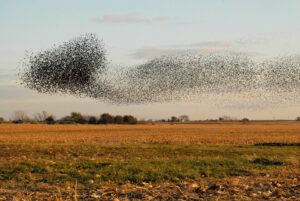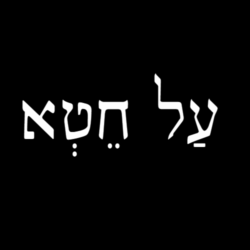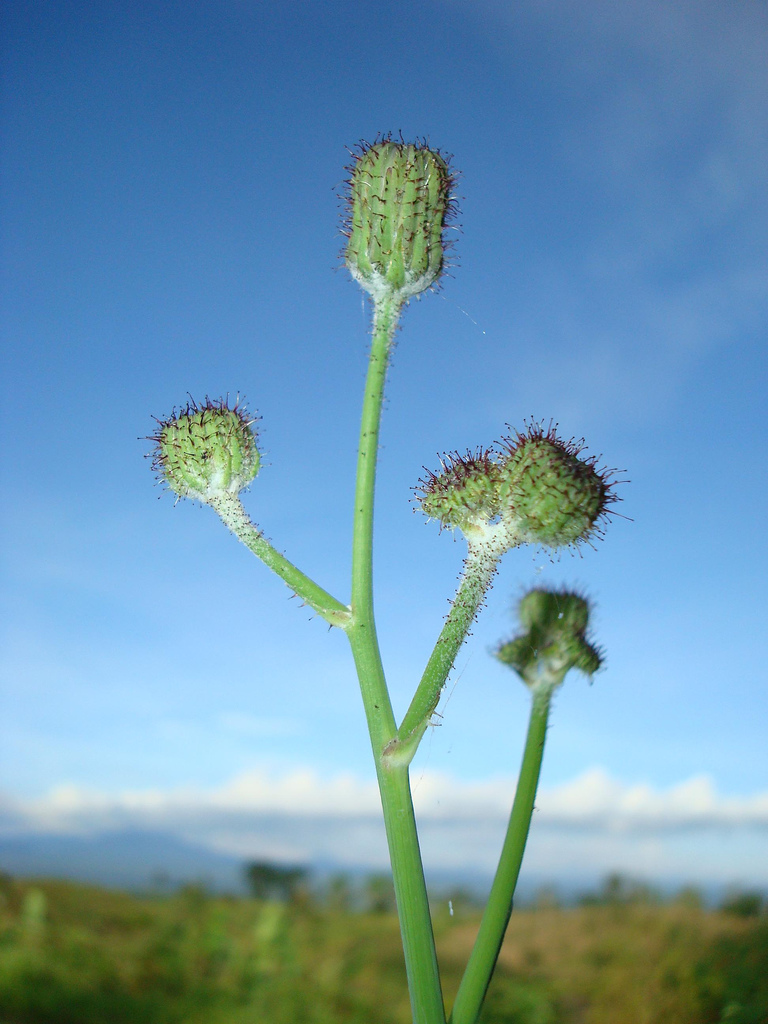This year and every year, we arrive at the gates of forgiveness as a we, as a squirming organism of humanness–fragile, flawed, alive, longing to change. Who is that we we may wonder now? It’s a we so wide all of our smaller we’s cannot even see its shifting edges.
We chant this litany of harms together, even if we did not commit each of the transgressions ourselves. We are declaring that we are in community with people who could possibly say these things in the “I.”
You don’t know who you’re saying it with, but you are saying it with them.
Every year, we must be in relationship to even approach forgiveness, to even imagine transformation, we have to practice solidarity, in all of its sacred discomfort.
This year, there is no more ignoring that we are inextricably linked to one another. The choices we make for ourselves are also choices made for our communities, even if we can’t see the droplet travel or the message carry.
This prayer is not a comprehensive list of every single sin we sinned, every error we erred, every mark we missed. The original Al Ḥeyt is intended to show us the roots of all failures, to dig beneath how we harm, to see where that hurt came from. We follow these trails together, not absolved from our own repairs, but never alone in struggles to uproot, to propagate new ways of being ourselves, new ways of being ourselves, of being together.
We can even examine the roots of the words themselves: the name of G-d invoked in this prayer means at its root “to join, to be connected.” When we petition G-d here, perhaps we are just praying to the divinity of we, towards our coursing luminous interconnectedness.
| Contribute a translation | Source (English) |
|---|---|
For the failure that we failed in front of your faces because we were forced to & on purpose– because we wanted to; because we were bent by violence and bent willingly to do violence. | |
And for the failure that we failed in front of your faces by a hard-heart & without even knowing it– because pressed & compressed it became impervious. | |
For the failure that we failed in front of your faces because we destroyed our knowing, we let our thinking rot & decay our temperament, our very minds. | |
And for the failure that we failed in front of your faces by our hollow lips– because our talk swelled, but yielded nothing; because our borders have only expanded. | |
For the failure that we failed in front of your faces that was revealed for all to see, and those that were hidden out of sight– because we were in exile & because we thought we were protecting ourselves. | |
And for the failure that we failed in front of your faces by revealing what wasn’t ours to reveal, uncovering skin that was not ours to uncover, for not honoring consent. | |
For the ways we hurt with the words of our mouth– because words matter; because the world is created with words. | |
And for being misled, for deceiving ourselves, believing what was not true– because we misled, we knew we were being dishonest. For fraud. | |
For our heart’s plans. | |
And for when we have wronged our friends & dispossessed our neighbors & oppressed our lovers. | |
For how we raised our hands to speak– for taking up space & letting our voice be heard over others. Did we take the blame or the credit for something we didn’t do? If we confessed, did it repair what we broke? Did we petition? Did we praise? Did we acknowledge? Pray? If we did, did we mean it? | |
And for making an appointment with mindlessness, using pleasure to numb out & to run from our truths. | |
For how we intended violence & for how we erred inadvertently because we were careless– because we assumed instead of asking; because we got excited and weren’t paying attention. | |
And for having contempt for those who have pointed the way for us– for disregarding our guardians, for neglecting the ones who parent us and despising the ones who teach us. | |
For misusing our strong hands– the ways we use our power to take, to possess– the ways we tighten our authority. | |
And for desecrating the name– the way we divert, dilute, violate & pollute our attention to the sacred. | |
For the mistakes we make with our stubborn mouth & the foolish things we say. | |
And for the way we clog our lips with it. | |
For bending ourselves into instruments of harm. | |
And for harming those we love & those we don’t. | |
וְעַל כֻּלָּם, אֱלֽוֹהַּ סְלִיחוֹת, סְלַח לָֽנוּ, מְחַל לָֽנוּ, כַּפֶּר־לָֽנוּ. |
ALL: V’al kulam Elo’ah seliḥot. S’laḥ lanu, m’ḥal lanu, kaper lanu. ALL: For all of it, the forger of forgiveness forgives us: Forgive us, Absorb us, Obliterate us towards healing. |
For the mark we missed by being knotted up in a bribe. | |
And for the mark we missed by being reduced, shrinking our truth. | |
For the mark we missed by sharpening our tongues. | |
And for the mark we missed by our scoffing. | |
For the mark we missed by willingly carrying the burden of capitalism. | |
And for the mark we missed by our food & drink– what we do to make our meals & how we attempt to satisfy ourselves. | |
For exploitation– when we take a bite out of others for profit. | |
And for arrogance– when we stretch our throats. | |
For the way we look at others– when our eyes don’t tell the truth, when they surveil. | |
And for planting idle talk in the mounds of the lips, without limits & without purpose. | |
For fronting with proud eyes– looking high above others’ heads, condescendingly. | |
And for our harsh forehead– unrestrained & unashamed of the harm we cause. | |
וְעַל כֻּלָּם, אֱלֽוֹהַּ סְלִיחוֹת, סְלַח לָֽנוּ, מְחַל לָֽנוּ, כַּפֶּר־לָֽנוּ. |
ALL: V’al kulam Elo’ah seliḥot. S’laḥ lanu, m’ḥal lanu, kaper lanu. ALL: For all of it, the forger of forgiveness forgives us: Forgive us, Absorb us, Obliterate us towards healing. |
For how we harmed by untying ourselves from the obligations of community– thinking we are throwing off a yoke. For believing we are broken and no longer belong & that what we do doesn’t matter; for not believing in our interdependence. | |
And for how we harmed by avoiding honest judgement of our actions. | |
For how we harmed when we entrapped, ensnared & hunted our friends, partners, neighbors & lovers. | |
And for how we harmed with our narrow vision, our selfish and envious look. For closing our eyes. | |
For how we harmed by not thinking things through fully & for our stiff-necks. | |
And for how we harmed by rushing towards hurting others & peddling mean rumors– telling stories that were not ours to tell. | |
For not deeply considering our commitments– we made promises we didn’t intend to keep; because we made an oath that produced nothing. | |
And for caressing our hatred– for hatred for no good reason. | |
For when we carelessly extend our bodies– for lending & not lending our hands. | |
And when we do not tune into our hearts, we hesitate, we confuse, we pull ourselves (apart) in two different directions. | |
וְעַל כֻּלָּם, אֱלֽוֹהַּ סְלִיחוֹת, סְלַח לָֽנוּ, מְחַל לָֽנוּ, כַּפֶּר־לָֽנוּ. |
ALL: V’al kulam Elo’ah seliḥot. S’laḥ lanu, m’ḥal lanu, kaper lanu. ALL: For all of it, the forger of forgiveness forgives us: Forgive us, Absorb us, Obliterate us towards healing. |
* * * | |
There is a doubling to how we hurt each other: It is because we waited, it is because we didn’t wait. Because we didn’t know when it was enough– that we are enough– because it’s never enough until we all get free. It’s in how we orient ourselves towards power. When we scoff at kings is not the same as when we scoff at our comrades. Because our knee is on someone’s neck or because we believe our temporary powerlessness is permanent. For deciding whose body belongs and whose does not. Because we ignored the past, because we did not dream up new futures. | |
Then there are the things that grow from those seeds: For the sin we commit by allowing the environment to be destroyed for private profit And for allowing our food, land, and water to be poisoned For the sin of war For the sin of racism & for anti-blackness For the sin of appeasing aggressors For the sin of colonization For the sin of obeying criminal orders For the sin of lacking civil courage For the sin of complicity in the gender binary | |
Do we forgive these? Are we forgiven, these? We can ask by making an offering. Is it a burnt-offering or a sin-offering? We can seek t’shuvah for anything & there are things we don’t forgive in a lifetime or even in the lives of the generation that’s coming. | |
When we speak about forgiveness. We say, for these, the joiner of forgiveness forgives to us. Because forgiveness has a direction & it is a going towards; because forgiveness remakes a relationship. | |
We are speaking of the kind of forgiveness that is a reconnection, a returning, a reweaving, an obligation, a way to stop doing things the way we have been doing them. | |
Forgiveness is what forgives us because forgiveness is a watering can; because forgiveness looks like drops from a vessel with two openings. | |
Forgiveness is what forgives us because forgiveness also means to blot out the systems that keep us hurting each other. We refuse them, we give them up, because forgiveness means to pass over with the palm of your hand to wipe something clean. Because if forgiveness means repair, it means reparations. |

“Al Ḥeyt, a paraliturgical translation by Shelby Handler & Maia Brown” is shared through the Open Siddur Project with a Creative Commons Attribution-ShareAlike 4.0 International copyleft license.










Leave a Reply